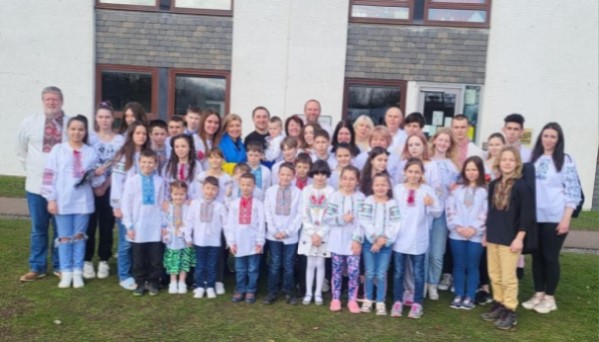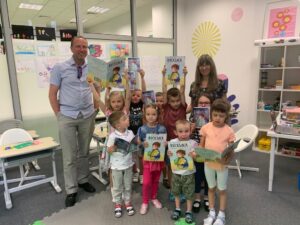
Why is this research necessary?
The Russian invasion of Ukraine started in February 2022 and is the largest European ground offensive since World War II. Countless civilians have been killed, and millions of children, women, and elderly people have fled the country. One study found that adolescents living in war-torn regions of Ukraine were at increased risk of experiencing depression, anxiety, and post-traumatic stress symptoms than those in the peaceful areas. These children are also likely to experience comorbidities; for example, those experiencing post-traumatic symptoms are at greater risk of developing depressive symptoms. During war, children are exposed to atrocities, organised violence, the disintegration of social networks, and resettlement during crucial physical, emotional, social, and cognitive development phases. Given this, there has been recognition by many organisations of the need to intervene to minimise the short- and long-term impacts of the war.
A trauma-focused CBT approach known as Teaching Recovery Techniques (TRT) has been shown to significantly reduce PTSD and depression symptoms in a sample of unaccompanied refugee minors in Sweden. Studies examining the link between war and parenting in ongoing humanitarian crises have highlighted the key role that parents or primary caregivers play. For example, among Lebanese adolescents who had recently been exposed to war, resilience was associated with having parents who spent time with them and supported them.
Considering such findings, the United Nations Office on Drugs and Crime (UNODC) combined the TRT intervention with parenting strategies designed to enhance the carer’s capacity to support children through life events such as disasters, conflicts, and displacement. TRT + Parenting was trialled in Lebanon with Syrian families. Children in the TRT+ Parenting group showed the greatest improvement in behavioural and emotional difficulties compared to children in the TRT or waitlist control groups. Caregivers in the TRT+ Parenting group also reported significant reductions in depression, anxiety, and stress. However, the efficacy of this intervention is yet to be examined among Ukrainian children and their caregivers.
What does the current study aim to do?

The TRUST trial aims to evaluate the efficacy of TRT + Parenting programme for child mental health, specifically symptoms of post-traumatic stress, anxiety, and depression, compared to similar children who only receive treatment/services as usual. This study also aims to measure parenting and parents’ mental health changes, specifically post-traumatic stress, depression, and anxiety.
Who can participate in the study?
This study will include 260 children aged 8-13 years old living in Ternopil, Ukraine. All children must screen positive for PTSD on the Child Revised Impact of Events Scale (CRIES-8).
What is the study design?
Schools will be randomly assigned to TRT + Parenting or a treatment-as-usual waitlist control group. Outcome data will be collected at three points: pre-intervention (T1), post-intervention (T2; c.8 weeks after randomisation), and follow-up (T3; c.20 weeks after randomisation).
What does TRT + Parenting involve?
TRT+ Parenting is an evidence-based, manualised intervention with a clear protocol and step-by-step practical workbook. It aids professionals working with children aged 8 years and older affected by conflict and displacement by teaching skills and techniques that help cope with the psychological effects of war and violence. It is a preventive programme intended to reduce the need for later treatment.
School psychologists will hold five 2-hour child sessions delivered in groups of up to 10 children, which cover memories, nightmares, flashbacks, difficulties in relaxing, concentrating, and sleeping, and fears associated with reminders of war. The intervention includes five 2-hour parenting sessions, including evidence-based parenting strategies to build self-regulatory skills and reduce the child’s emotional and behavioural difficulties. This includes understanding behavioural changes, increasing positive parent-child interactions through taking time to notice and praise desirable behaviour, and effective, consistent disciplinary approaches using simple techniques such as behaviour charts to reward desirable behaviour.
Who is the research team?

Queen Mary University of London is the sponsor of this study where Dennis Ougrin is a consultant child psychiatrist. Ternopil Volodymyr Hnatiuk National Pedagogical University will manage research activities in Ukraine. It will be led by Dr Halyna Radchuk, Head of the Psychology and Counselling Department. Other collaborators include the University of Manchester, The United Nations Office of Drugs and Crime, Heal Ukraine Traumas, and Children and War UK.
What are the implications of this research?
This project will contribute new evidence to address a critical research gap: the efficacy of TRT + Parenting on the mental health of children and their parents who remain in an active war zone. This project may be eligible for inclusion in policy documents and could have significant global implications for all war-affected countries. The UN Sustainable Development Goals highlight the importance of developing and implementing evidence-based interventions to support the well-being of families and prevent future emotional and behavioural problems. We will contribute to these goals by increasing the recruitment, development, and training of the mental health staff in schools in Ukraine.
- SEO Powered Content & PR Distribution. Get Amplified Today.
- PlatoData.Network Vertical Generative Ai. Empower Yourself. Access Here.
- PlatoAiStream. Web3 Intelligence. Knowledge Amplified. Access Here.
- PlatoESG. Carbon, CleanTech, Energy, Environment, Solar, Waste Management. Access Here.
- PlatoHealth. Biotech and Clinical Trials Intelligence. Access Here.
- Source: https://blogs.biomedcentral.com/on-medicine/2023/09/12/teaching-recovery-techniques-plus-parenting-a-cluster-randomised-controlled-trial-in-ukrainian-schools-in-ternopil-trust-isrctn/



